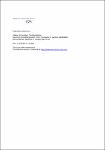Vaccines for Leishmaniasis: From proteome to vaccine candidates
Schroeder, Juliane
Aebischer, Toni
Leishmania spp. cause a wide spectrum of tropical diseases which are threatening an estimated 350 million people around the globe. While in most cases non-fatal, the disease is associated with high morbidity, social stigmata and poverty. However, the most severe form visceral leishmaniasis can be fatal if left untreated. Chemotherapeutics are available but show high toxicity, costs and are prone to resistance development due to prolonged treatment periods. Healing is associated with a life-long resistance to re-infection and this argues for the feasibility of vaccination. However, despite much effort, no such vaccine has become available yet. Here, the status of vaccine development in this field is briefly summarized before the focus is set on the promise of reverse vaccinology for anti-Leishmania vaccine development in the post-genomic era. We report on our own experience with this approach using an instructive example of successful candidate vaccine antigen identification.
Dateien zu dieser Publikation
Keine Lizenzangabe

